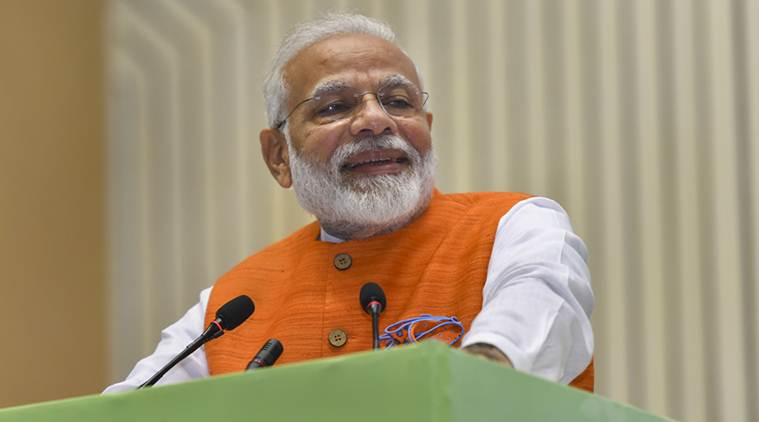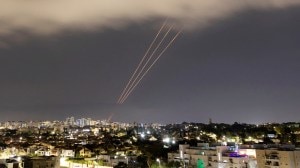- India
- International
Raja Mandala: New Delhi’s diplomacy indicates its willingness for more productive engagement with Brussels
That no prime minister has visited Hungary since Rajiv Gandhi in 1988 and Poland since Morarji Desai in 1979, underlines India’s strategic neglect of Central Europe all these decades. As the region’s weight grows within Europe, Eurasia and the world, Jaishankar’s visit has hopefully created the basis for a more productive engagement with the region.
 Prime Minister Narendra Modi. (PTI/File)
Prime Minister Narendra Modi. (PTI/File)
Prime Minister Narendra Modi’s visit to Biarritz on the Atlantic coast of France late last month to join the G-7 leaders as a special guest of President Emmanuel Macron and his travels to Vladivostok on Russia’s Pacific coast for a meeting with the Russian President Vladimir Putin this week helps frame the growing importance of Eurasia for India’s changing geopolitics. The Modi government is unwilling to buy the proposition that the tension between the concepts of Eurasia and the Indo-Pacific is real. Russians and Chinese establishments see the “Indo-Pacific” as an effort to contain China. The Americans believe the promotion of “Eurasia” is about a Sino-Russian design to marginalise the US in the continental space.
Located at the crossroads of Asia and at the heart of the Indian Ocean, India sees itself as a maritime power in the Indo-Pacific with big interests in continental Eurasia. Delhi may find Europe is the right partner in overcoming the presumed tension between the two concepts. In his bilateral talks with Macron last month, Modi highlighted the importance of India’s new alliance with France, by coining a characteristic acronym, IN-FRA, that might be critical for India in both the maritime and continental domains.
Meanwhile, External Affairs Minister S Jaishankar’s visit to Moscow, Budapest, Warsaw and Brussels in the last few days may have laid the basis for thinking more strategically about Europe. Jaishankar’s visit should also elevate Central Europe in the list of India’s diplomatic priorities.
In deepening its partnership with Europe, Delhi can overcome some of the recent challenges that have emerged in the conduct of its foreign policy. First is the Russian question. If the end of the Cold War, the collapse of the Soviet Union and the integration of Russia into the global order opened up enormous geopolitical space for India after 1991, renewed tensions between Russia and the West have begun to shrink Delhi’s room for manoeuvre.
Macron is leading a new effort, very welcome in Delhi, to ease the conflict between Russia and the West. He has the strong backing of US President Donald Trump, who has made the public case for bringing Russia back into the collective “Western” forums such as the G-7. Russia was suspended from the G8 forum after its intervention in Ukraine in 2014. France and Germany are planning to make a fresh bid to resolve the European stand-off with Russia on Ukraine.

Paris is not the only one eager for a reconciliation with Russia; Tokyo is even more enthusiastic. When he arrives at the annual summit of the Eastern Economic Forum in Vladivostok this week, Modi will run into his friend and partner, Shinzo Abe. The Japanese prime minister has attended the Forum since it was launched in 2015. Abe has consistently sought to resolve the long-standing territorial dispute with Russia and make Moscow a partner in the Japanese strategy for the Indo-Pacific. No country has a higher stake than India in seeing a rapprochement between Russia and its European neighbours in the west and Japan in the east.
Second, as it seeks to address the current contradictions in Eurasia, France is eager to work with India in developing new coalitions to stabilise the Indo-Pacific. France, a resident power in the Indo-Pacific, is eager work with India, Japan, Australia and other nations to prevent the littoral from becoming a hostage to the vagaries of US-China relations.
Third is the problem of US-China tensions over trade that is affecting all major nations, including India. Delhi has good reasons to support the initiative by France, Japan and others to save the global trading system through much needed reforms to make it work for all nations. In the past, India’s preference was to forge coalitions like the G-77 that have long ceased to be effective. Working with Europe and Japan, however, might lend greater weight and credence to India’s trade diplomacy.
Fourth, India has a strong interest in joining the so-called “Alliance for Multilateralism” — a German initiative backed by France — that calls for modernising international institutions, strengthening the rules-based order and promoting global, rather than national, solutions to global challenges. It does not include the US, Russia and China, but is drawing many middle powers like Japan and Canada in the developed world and South Africa in the developing world.
The alliance is set to be launched later this month on the margins of the annual session of the UN General Assembly in New York. India, which is already working with France in promoting the International Solar Alliance, may find the Alliance for Multilateralism useful in reinforcing its new international initiatives such as cooperation on humanitarian assistance and disaster relief that Modi is expected to announce in his address to the UN.
Last, but not least, there is room for expansive cooperation between India and the Central European states. In sticking to its traditional method of engaging Europe through big powers, India has neglected the enormous possibilities for mutual enrichment with other European states as well as the European Union. Jaishankar’s visit to Brussels, hopefully, renews the momentum in the partnership with the EU.
That no prime minister has visited Hungary since Rajiv Gandhi in 1988 and Poland since Morarji Desai in 1979, underlines India’s strategic neglect of Central Europe all these decades. As the region’s weight grows within Europe, Eurasia and the world, Jaishankar’s visit has hopefully created the basis for a more productive engagement with the region. It could begin with an early summit meeting between the PM and the leaders of the Visegrad group — the Czech Republic, Hungary, Poland and Slovakia.
This article first appeared in the print edition on September 3, 2019 under the title ‘Reaching out to Europe’. The writer is director, Institute of South Asian Studies, National University of Singapore and contributing editor on international affairs for The Indian Express
EXPRESS OPINION
More Explained
Apr 19: Latest News
- 01
- 02
- 03
- 04
- 05









































